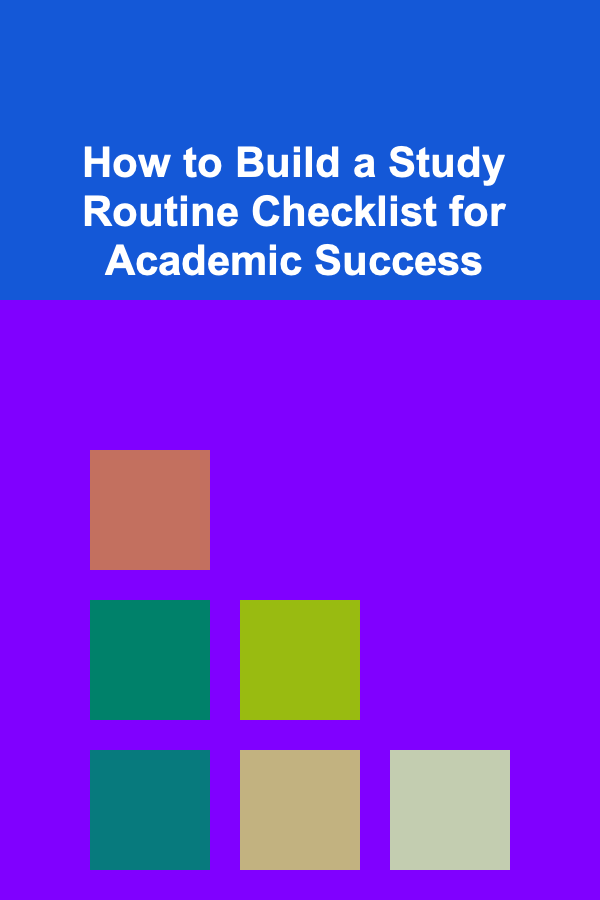
How to Build a Study Routine Checklist for Academic Success
ebook include PDF & Audio bundle (Micro Guide)
$12.99$10.99
Limited Time Offer! Order within the next:

Creating an effective study routine is one of the most crucial components of achieving academic success. Whether you're a high school student, a college undergraduate, or someone looking to advance your learning, a well-structured study routine can make a significant difference in your productivity and retention of information. This guide will walk you through the process of building a study routine checklist, with actionable steps to ensure that your time is utilized wisely and effectively.
Understand Your Learning Style
Before you dive into creating a study routine, it's essential to understand your own learning style. People have different preferences for how they absorb information, and tailoring your study habits to fit these preferences can improve retention and comprehension.
Common Learning Styles:
- Visual Learners: These learners prefer to see information presented through diagrams, charts, and written notes. If you're a visual learner, consider using color-coded notes, mind maps, and flashcards.
- Auditory Learners: These learners excel when information is delivered verbally. Podcasts, audio recordings, or even reading notes out loud can help reinforce learning.
- Kinesthetic Learners: Kinesthetic learners learn best through hands-on experience or movement. Use study techniques that involve physical activities, such as writing out notes by hand, using models, or engaging in practice exercises.
- Reading/Writing Learners: These learners prefer reading and writing as their primary method of learning. They may benefit from extensive note-taking, writing summaries, and reading textbooks or research papers.
By recognizing your learning style, you can create a study routine that utilizes techniques suited to your strengths.
Set Clear, Specific Goals
One of the biggest challenges in academic success is knowing what exactly you want to achieve. Setting clear and specific goals provides direction and purpose to your study routine. This involves both long-term goals and short-term goals.
Long-Term Goals:
These are overarching objectives you want to accomplish over the course of a semester, year, or entire academic career.
- Example: "Achieve an A in all of my courses this semester."
Short-Term Goals:
These are smaller, more manageable goals that help you reach your long-term objectives. They could focus on specific chapters, assignments, or exams.
- Example: "Finish reading Chapter 5 by the end of the week" or "Complete practice problems for Physics by Tuesday."
SMART Goal Framework:
To ensure your goals are effective, use the SMART criteria:
- Specific: Define exactly what you want to achieve.
- Measurable: Ensure the goal is quantifiable.
- Achievable: Make sure the goal is realistic.
- Relevant: Ensure the goal is meaningful and aligned with your long-term objectives.
- Time-bound: Set a clear deadline for achieving the goal.
By structuring your goals in this way, you can stay focused and motivated.
Create a Study Schedule
A study schedule is the backbone of a productive study routine. It not only helps you allocate your time effectively but also ensures that you consistently progress toward your academic goals.
Time Block Your Study Sessions:
- Morning or Evening Study Sessions: Choose the times of day when you are most alert and focused. For many students, early mornings or late evenings work best for uninterrupted study time.
- Duration of Sessions: Study sessions should be long enough to focus deeply, but not so long that they lead to burnout. Aim for 45 to 60 minutes per session, followed by a 10 to 15-minute break.
- Break Time: Don't skip breaks! Taking short breaks after intense study sessions helps maintain focus and improves retention. Use techniques like the Pomodoro method (25 minutes of study, followed by a 5-minute break) to stay fresh.
Include All Key Tasks:
Make sure to include a variety of tasks in your study schedule, such as:
- Reviewing lecture notes: Quickly go over notes taken during classes to reinforce the material.
- Reading: Dedicate time to reading textbooks or additional materials related to your courses.
- Practice: Engage in problem-solving, practice questions, and active recall techniques.
- Active Learning: Incorporate techniques like summarizing information in your own words, teaching what you've learned to someone else, or using flashcards to test your memory.
Flexibility:
While it's important to have a structure, also be flexible. Life can throw curveballs, and sometimes you'll need to adjust your study schedule. Build in buffer times for unexpected events.
Prepare Your Study Environment
Your study environment plays a critical role in how well you can concentrate and absorb information. Ensuring that your study space is conducive to learning can have a huge impact on your focus and productivity.
Key Factors for an Effective Study Environment:
- Lighting: Ensure that the area is well-lit, preferably with natural light. A poorly lit space can cause eye strain and reduce your ability to focus.
- Quiet: Try to find a quiet area free from distractions. If you're in a shared space, noise-canceling headphones can help.
- Organized: Keep your study space clean and free from clutter. A tidy desk can reduce stress and help you focus.
- Tools and Supplies: Have everything you need within reach. This includes pens, highlighters, notebooks, textbooks, and a computer or tablet if required for research.
Incorporate Active Study Techniques
Passive reading or re-reading notes is often not enough to truly master the material. Instead, use active learning strategies that engage your mind and help you retain and understand the information better.
Effective Active Study Techniques:
- Spaced Repetition: Review material at increasing intervals to combat forgetting. Use flashcards or apps like Anki to facilitate spaced repetition.
- Active Recall: Instead of passively reading notes, actively test yourself on the material. After studying a section, close your book and try to recall key points without looking.
- Mind Mapping: Create mind maps to visualize the relationships between different concepts. This technique is especially useful for visual learners.
- Teach Someone Else: One of the best ways to test your understanding is to explain the material to someone else. If you can teach a concept clearly, it means you've truly mastered it.
- Practice Problems: If you're studying math, science, or any subject that involves problem-solving, make sure to practice problems regularly.
Monitor and Track Your Progress
An effective study routine isn't just about setting goals and following schedules---it's about assessing your progress and making adjustments as necessary. Regularly review how well you are sticking to your study routine and achieving your goals.
Track Your Study Time:
Use a study tracker or app to log the time you spend studying each day. This will help you see how much time you're dedicating to each subject and whether you need to adjust your priorities.
Reflect and Adjust:
At the end of each week, reflect on your progress:
- Did you accomplish your goals for the week?
- Are you facing any challenges in your routine?
- Are there any subjects or areas where you need to dedicate more time?
By continuously monitoring your progress, you'll be able to fine-tune your study routine for maximum efficiency.
Stay Motivated and Avoid Burnout
Studying for long periods without breaks can lead to burnout, which will negatively impact your performance. Maintaining motivation over the long term is key to academic success.
Tips for Staying Motivated:
- Set Rewards: After completing a challenging study session or achieving a goal, reward yourself. This can be something as simple as a snack, watching a favorite show, or enjoying a hobby.
- Stay Positive: Focus on the progress you've made, not just what you have left to do. Celebrate small wins to stay motivated.
- Peer Support: Join a study group or connect with classmates who can provide encouragement and help keep you accountable.
- Healthy Lifestyle: Exercise regularly, eat nutritious meals, and get enough sleep. A healthy body supports a sharp mind, making it easier to focus and retain information.
Conclusion
Building a study routine checklist is not a one-size-fits-all solution---it's about finding what works best for you, setting clear goals, and sticking to a plan. By organizing your study schedule, preparing a conducive study environment, incorporating active study techniques, and regularly monitoring your progress, you can greatly improve your academic performance.
Remember, consistency is key. It's not about cramming the night before an exam but steadily and persistently working toward your goals. With the right mindset and a well-thought-out study routine, academic success is within your reach.

How to Build a Tax Preparation Checklist for Entrepreneurs
Read More
How to Extend the Life of Your Roof with Proper Maintenance
Read More
How to Organize Your Essential Oils for Craft Projects
Read More
How to Use the Envelope System for Better Budgeting
Read More
Designing Minimalist Presentation Slides: A Deep Dive
Read More
10 Tips for Effective Code Review as a Software Engineer
Read MoreOther Products

How to Build a Tax Preparation Checklist for Entrepreneurs
Read More
How to Extend the Life of Your Roof with Proper Maintenance
Read More
How to Organize Your Essential Oils for Craft Projects
Read More
How to Use the Envelope System for Better Budgeting
Read More
Designing Minimalist Presentation Slides: A Deep Dive
Read More